The AMD Ryzen Threadripper 3960X and 3970X Review: 24 and 32 Cores on 7nm
by Dr. Ian Cutress, Andrei Frumusanu & Gavin Bonshor on November 25, 2019 9:05 AM ESTCPU Performance: Web and Legacy Tests
While more the focus of low-end and small form factor systems, web-based benchmarks are notoriously difficult to standardize. Modern web browsers are frequently updated, with no recourse to disable those updates, and as such there is difficulty in keeping a common platform. The fast paced nature of browser development means that version numbers (and performance) can change from week to week. Despite this, web tests are often a good measure of user experience: a lot of what most office work is today revolves around web applications, particularly email and office apps, but also interfaces and development environments. Our web tests include some of the industry standard tests, as well as a few popular but older tests.
We have also included our legacy benchmarks in this section, representing a stack of older code for popular benchmarks.
All of our benchmark results can also be found in our benchmark engine, Bench.
Speedometer 2: JavaScript Frameworks
Our newest web test is Speedometer 2, which is a accrued test over a series of javascript frameworks to do three simple things: built a list, enable each item in the list, and remove the list. All the frameworks implement the same visual cues, but obviously apply them from different coding angles.
Our test goes through the list of frameworks, and produces a final score indicative of ‘rpm’, one of the benchmarks internal metrics. We report this final score.
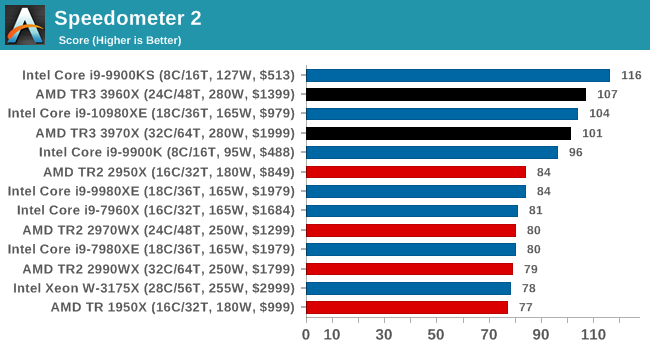
Google Octane 2.0: Core Web Compute
A popular web test for several years, but now no longer being updated, is Octane, developed by Google. Version 2.0 of the test performs the best part of two-dozen compute related tasks, such as regular expressions, cryptography, ray tracing, emulation, and Navier-Stokes physics calculations.
The test gives each sub-test a score and produces a geometric mean of the set as a final result. We run the full benchmark four times, and average the final results.
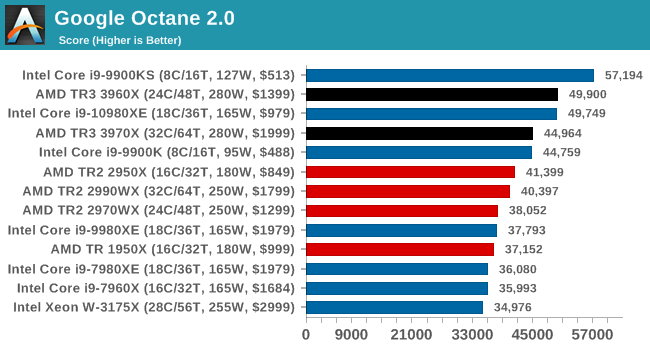
Mozilla Kraken 1.1: Core Web Compute
Even older than Octane is Kraken, this time developed by Mozilla. This is an older test that does similar computational mechanics, such as audio processing or image filtering. Kraken seems to produce a highly variable result depending on the browser version, as it is a test that is keenly optimized for.
The main benchmark runs through each of the sub-tests ten times and produces an average time to completion for each loop, given in milliseconds. We run the full benchmark four times and take an average of the time taken.
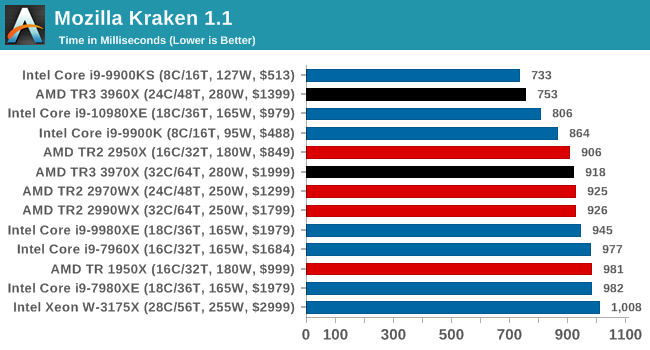
3DPM v1: Naïve Code Variant of 3DPM v2.1
The first legacy test in the suite is the first version of our 3DPM benchmark. This is the ultimate naïve version of the code, as if it was written by scientist with no knowledge of how computer hardware, compilers, or optimization works (which in fact, it was at the start). This represents a large body of scientific simulation out in the wild, where getting the answer is more important than it being fast (getting a result in 4 days is acceptable if it’s correct, rather than sending someone away for a year to learn to code and getting the result in 5 minutes).
In this version, the only real optimization was in the compiler flags (-O2, -fp:fast), compiling it in release mode, and enabling OpenMP in the main compute loops. The loops were not configured for function size, and one of the key slowdowns is false sharing in the cache. It also has long dependency chains based on the random number generation, which leads to relatively poor performance on specific compute microarchitectures.
3DPM v1 can be downloaded with our 3DPM v2 code here: 3DPMv2.1.rar (13.0 MB)
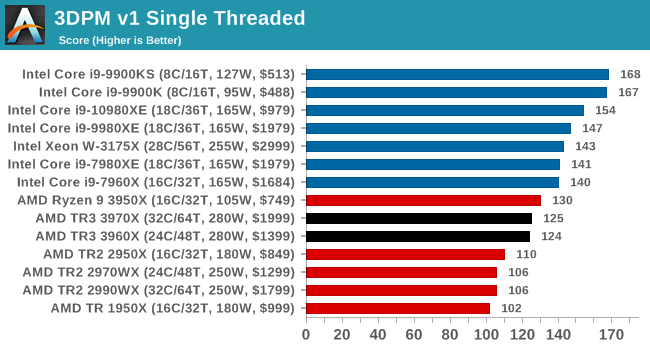
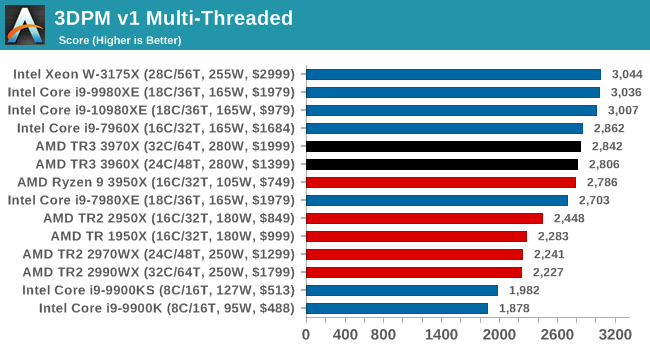
x264 HD 3.0: Older Transcode Test
This transcoding test is super old, and was used by Anand back in the day of Pentium 4 and Athlon II processors. Here a standardized 720p video is transcoded with a two-pass conversion, with the benchmark showing the frames-per-second of each pass. This benchmark is single-threaded, and between some micro-architectures we seem to actually hit an instructions-per-clock wall.
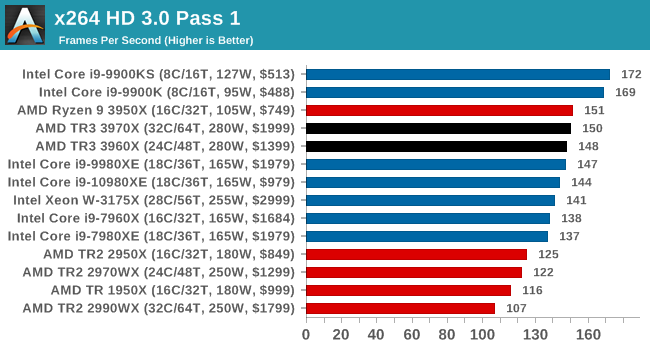
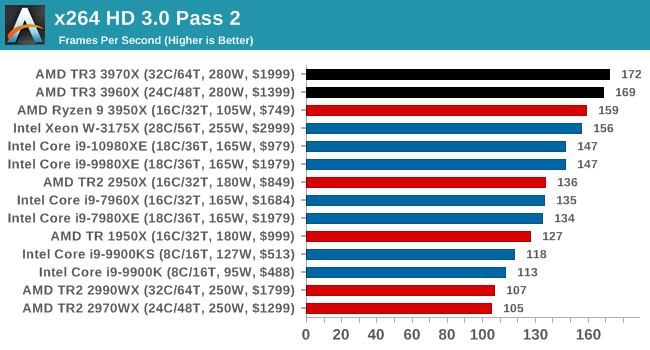
GeekBench4: Synthetics
A common tool for cross-platform testing between mobile, PC, and Mac, GeekBench 4 is an ultimate exercise in synthetic testing across a range of algorithms looking for peak throughput. Tests include encryption, compression, fast Fourier transform, memory operations, n-body physics, matrix operations, histogram manipulation, and HTML parsing.
I’m including this test due to popular demand, although the results do come across as overly synthetic, and a lot of users often put a lot of weight behind the test due to the fact that it is compiled across different platforms (although with different compilers).
We record the main subtest scores (Crypto, Integer, Floating Point, Memory) in our benchmark database, but for the review we post the overall single and multi-threaded results.
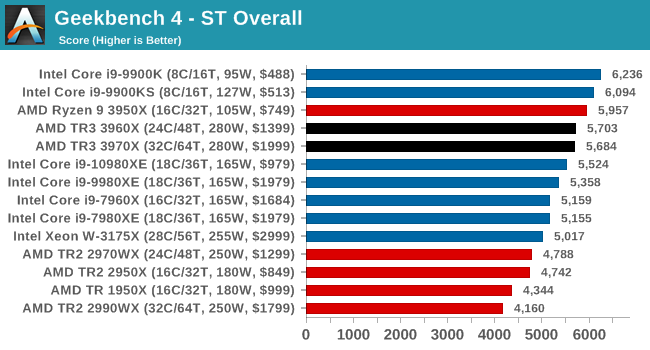
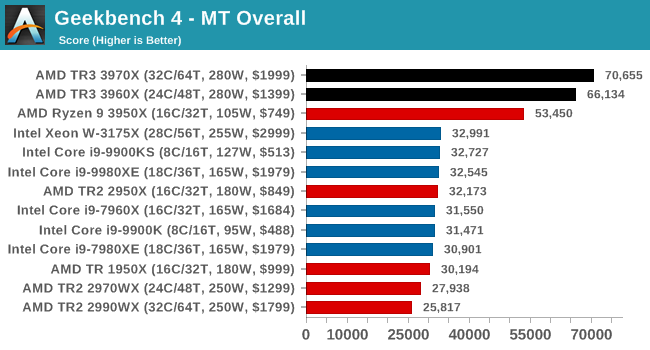










245 Comments
View All Comments
melgross - Tuesday, November 26, 2019 - link
What you’re missing is that I’m talking about most users. The ones you mention are in very small numbers. There’s about a billion Windows machines out there, well under 1% need 16 or more cores. That still millions, but it’s not enough to move the market.What been one of the biggest problems involving pc sales the past year? Intel not producing enough chips. Not AMD. AMD is almost an afterthought. Most vendors and customers don’t want AND. Most pc users have never even heard of and. It’s why the are cheaper, and make little profit. They sell on price. And they’re trying to move in a market Intel isn’t very interested in—yet.
Xyler94 - Tuesday, November 26, 2019 - link
Most people just need their ARM powered cell phones these days, if you really want to get down to reality. light web browsing, posting on Facebook, sending an IM on messenger, potentially watching YouTube. All things that can be done off a cellphone. For those who need a bigger display, laptops are a good choice, but see little use outside of a few instances where a bigger screen is necessary.maxxbot - Tuesday, November 26, 2019 - link
And it's a continuously moving target too, just a few years ago people would say 8 cores is way more than necessary, now it's a baseline.mdriftmeyer - Tuesday, November 26, 2019 - link
Yes they do Mel. You just don't seem to know it. When Zen 3 get AVX 512 Apple has no more need of Intel, period. Mac Pro down to Macbook Air can be replaced w/ superior low power, higher performance per watt, lower priced CPUs to match RDNA 2.0 GPGPUs.xrror - Tuesday, November 26, 2019 - link
About the too much power... it might be that nobody is saying anything because if you fully load the processor with a workload where it draws it's full 300w.......it means that it's performing a workload that a few years prior would have required 4 separate machines at full tilt to match, and I'm pretty sure that 4 older gen HEDT rigs running full tilt is going to be drawing something significantly more than 300w overall in CPU power, let alone the rest of the rigs.
Korguz - Wednesday, November 27, 2019 - link
that is not what it means....beggerking@yahoo.com - Monday, November 25, 2019 - link
you forgot virtualization. now people can run virtualized environment for casual things such as file server, media server, backups, scheduler server, and even host their own websites.Dug - Monday, November 25, 2019 - link
You forgot the cost of virtualization if using Windows. They charge per core now, not per processor.Alistair - Tuesday, November 26, 2019 - link
The cost per core is a bit problem for AMD. Company just bought 3 x Epyc servers, and the much lower price was blunted by the per core licensing. Microsoft is effectively supporting Intel unintentionally... would rather they charge based on the MSRP of the CPU or something...Alistair - Tuesday, November 26, 2019 - link
big